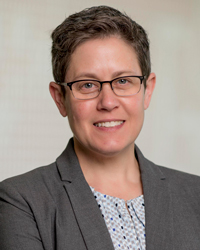Precedent set in racial discrimination cases should extend to LGBTQ, law professor says
LAWRENCE — High-profile cases have circulated through American courts in which people argue their religious beliefs allow them to not provide goods or services to same-sex couples. A University of Kansas law professor writes in a new article that while the question of whether such denials are legal has not been settled, precedent set in cases in which requests for racially motivated religious exemptions should apply to LGBTQ cases as well.
 Kyle Velte, associate professor of law at KU, has written “Errant Exceptionalism,” an article that reviews the history of requests for religious exemptions from racial civil rights laws and objections to request for religious exemptions based on sexual orientation, and she asserted that the law should not allow exemptions from LGBTQ civil rights laws. The article will be published in the Cardozo Law Review (.pdf) in fall 2020.
Kyle Velte, associate professor of law at KU, has written “Errant Exceptionalism,” an article that reviews the history of requests for religious exemptions from racial civil rights laws and objections to request for religious exemptions based on sexual orientation, and she asserted that the law should not allow exemptions from LGBTQ civil rights laws. The article will be published in the Cardozo Law Review (.pdf) in fall 2020.
Perhaps the best-known case, Masterpiece Cakeshop v. Colorado Civil Rights Division, was ruled upon in 2018 by the Supreme Court. The court held the cakeshop owner was allowed to refuse selling a cake to a same-sex couple based on the First Amendment requirement of government neutrality toward religion. It did not rule, however, on the question of whether vendors have a First Amendment right to deny goods and services to LGBTQ people based on their religious belief. Similar cases are circulating through various courts and will undoubtedly reach the Supreme Court soon, Velte said. When such a case does, she said precedent shows that such exemptions should not be allowed.
In 1968, the Supreme Court ruled in Newman v. Piggie Park that the owner of a barbecue restaurant was not allowed to deny service to black customers. The white owner argued his religion did not condone mixing of races; therefore, he should not have to serve those outside of his race even though the newly enacted Civil Rights Act of 1964 required him to do so. The U.S. Supreme Court rejected his argument. Since the ruling, exemptions to civil rights laws that require providing service equally to all races, even if based on religious belief, have been rejected. LGBTQ discrimination cases are commonly argued making an analogy to race and Piggie Park’s rejection of an exemption based on religious beliefs about race; these LGBTQ advocates argue that similar denials of service should not be allowed based on religion. In her article, Velte summarized objections from the political left, right and courts. The race analogy should apply, she wrote.
“Using Piggie Park as legal precedent, if you substitute sexual orientation for race, you get the Masterpiece case. But the question of whether race analogy should be applied in religious exemption cases involving sexual orientation is hotly contested. I’m arguing the outcome should be clear. I think if the court uses the race analogy, then the bakers, photographers and wedding vendors would have to lose, and LGBTQ plaintiffs would have to win.”
Within her taxonomy of objections to the race analogy, Velte pointed out the reasoning and legal merits of each. The article’s title, “Errant Exceptionalism,” reflects two of Velte’s assertions. The first is that those who claim that the race analogy should not apply to religious exemption cases involving sexual orientation discrimination are errant in their reasoning. The second is that if the Supreme Court rejects the race analogy it will treat sexual orientation as an exception to the general rule that applies to race; Velte contends that this exceptionalism would be errant because it will create lack of doctrinal coherence by permitting a religious exemption for one class of consumers (sexual orientation) but not another (race).
“A lot of the objections from the left center on ‘let’s not leave anyone behind’ to make sure no one is discriminated against,” Velte said, and that her narrow argument for the race analogy would allow an LGBTQ civil rights agenda that is broad and inclusive.
With regard to objections from the right, Velte said, “I think the courts may see the objections from the right to using the race analogy as meritorious, but I don’t agree.”
A large part of the article’s value is summarizing objections and legal precedent in related cases, which could help lawyers and clients involved in ongoing cases, as well as advocates and those working for LGBTQ rights. Velte also plans to turn the article into an amicus brief for the Supreme Court for an upcoming religious exemption case in which a Catholic foster care agency in Philadelphia prevented same-sex couples from serving as foster parents, even though a local law prohibits sexual orientation discrimination.
While the law has not settled whether vendors may receive a religious exemption from LGBTQ civil rights laws and thus deny goods and services to LGBTQ individuals, Velte said she thinks the law will eventually follow evolving societal norms. When it comes time for the Supreme Court to make such a ruling, she said that the Piggie Park precedent has already determined that such exemptions should not be allowed. American courts accept citizens’ religious beliefs and their right to hold them, no matter what the faith and no matter what the belief. However, Piggie Park directs that the right to such religious beliefs does not extend to discriminating against others.